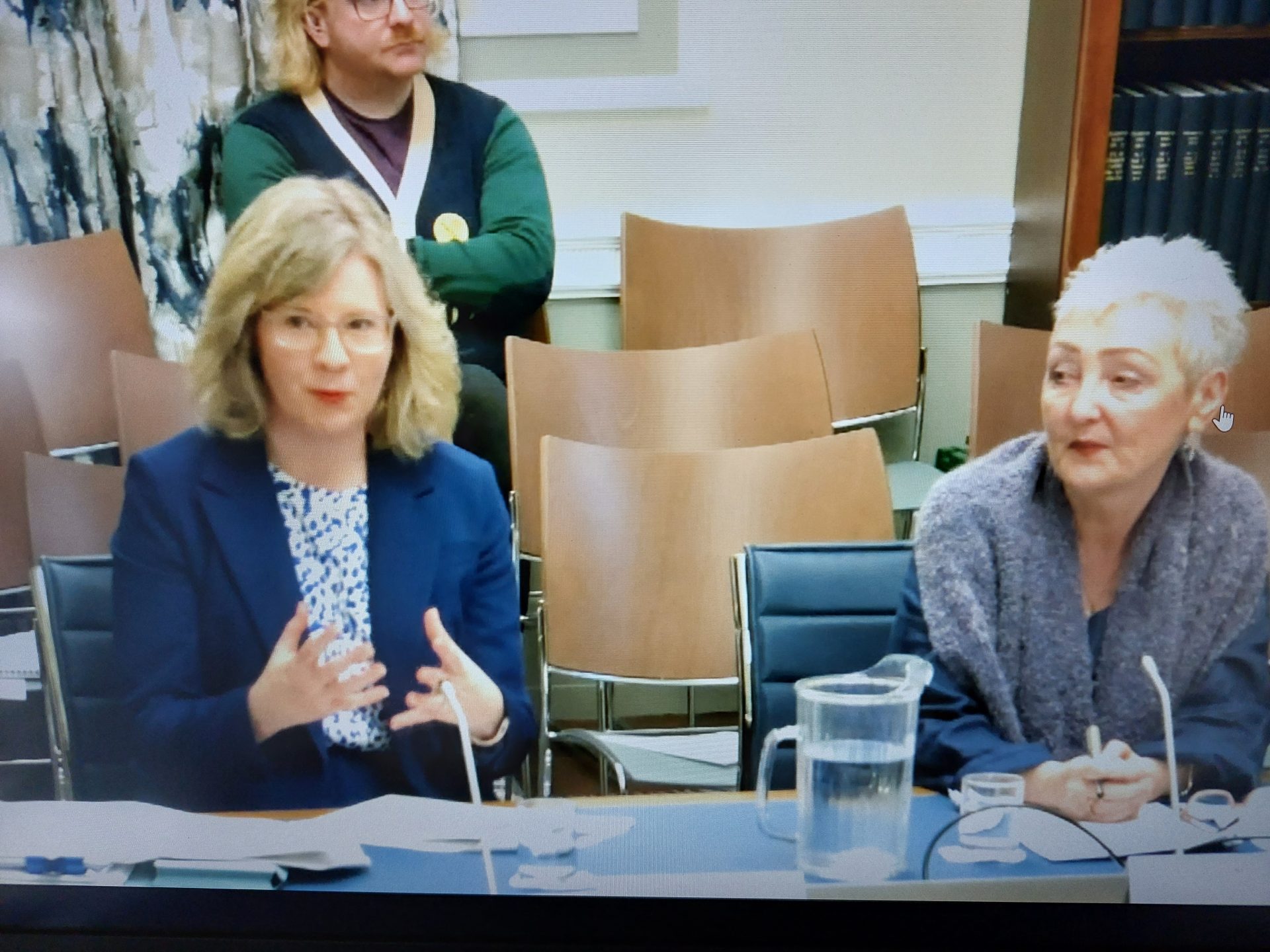Update on new Early Learning and Childcare Strategy – February 2024
Senior officials from the Department of Education, including Paul Brush, Director of Early Years, Children and Youth, provided a briefing to the Northern Ireland Assembly Education Committee on Wednesday 28 February. Their evidence included an update on the development of the new Early Education and Childcare Strategy and associated childcare support scheme. They also revealed that work is progressing to scope interim support to relieve some of the pressure childcare providers and parents are under at this time.
Update on development of new Early Learning and Childcare Strategy
In response to a question from Cathy Mason, MLA, Paul Brush outlined that the Minister is looking at a number of different models for financial support, as part of work to develop the new Early Learning and Childcare Strategy, and is meeting with many interested stakeholders. He also plans to meet with the Childcare Stakeholder Engagement Forum to listen to their views.
The Minister’s immediate focus includes:
- Standardisation of 22.5 hours pre-school places – there was an acknowledgement that it could take a number of years before the capacity within the sector is built for this to be fully rolled out.
- Stabilisation of the childcare sector – to avoid cuts or threats of cuts which had such a major destabilising impact when proposed last year, leading to the loss of much expertise within the sector.
- Interim support measures – recognising that development and implementation of the full, integrated Early Learning and Childcare Strategy will take time, the Minister is aware of the current pressures facing parents and childcare providers and work is ongoing to scope what interim ‘easements’ could be brought forward to ease these.
He also made it clear that both the Minister and the Department recognise the issues with funding and implementation of the 30 hours free childcare scheme in England.
When asked by Cheryl Brownlee, MLA about a timeline for the new Strategy, Paul Brush outlined that the Strategy is a long-term piece of work and that it won’t be delivered “overnight”. He said there is work progressing to see what support can be put in place as an interim measure. He also noted that any interim measures would provide a learning opportunity to inform the development of the longer-term solution.
A task and finish group is being set up across Departments in coming weeks – this will be cross-departmental, in light of the cross-cutting impact of childcare. It is envisaged that this group will have input from a smaller, more focused group of sectoral stakeholders.
Kate Nicholl, MLA expressed concern about the lack of immediate action and support, given that the increase to the National Minimum and Living Wage (NLW/NMW) is taking effect so soon. While welcome in increasing rates of pay for many working across the sector, she highlighted that – in the absence of Government support – parents will have to shoulder that cost. She stressed that people need urgent support and failure to provide this will have huge ramifications. She also sought an update on what additional support will be provided to enable Sure Start settings to uplift staff salaries.
Paul Brush responded by reiterating the importance of the work around stabilisation to redress damage already done to the sector, but was unable to provide assurances around specific support, or what uplifts would be provided to Sure Starts. He said the Minister is aware of the need to take urgent action but he wished to “manage expectations” around the potential of anything being done before the beginning of April. Issues that need to be considered include the degree to which settings will be impacted by the NLW/NMW increase, and the need to ensure there aren’t knock on implications for other parts of the economy.
Kate advised that the Committee want to see costed options and details of the urgent support that could be provided as soon as possible together with a timeline for the Childcare Strategy, as well as details of when the task and finish group that is being set up is expected to complete its work.
Nick Mathison, MLA – and Chair of the Committee – acknowledged that while it’s important there is due regard to process, this must be balanced with a need to ensure any support scheme for the sector must not be cumbersome or complex for providers, and that they can access the support they need quickly.
Raising awareness of existing financial support schemes
It was raised by both Cara Hunter, MLA and David Brooks, MLA that there needs to be a campaign to raise awareness of the childcare financial support schemes that currently exist to ensure all parents are claiming what they are entitled to. Cara Hunter highlighted the £105 million that has been identified for families by Employers For Childcare’s Family Benefits Advice Service and asked how this could be further promoted. Paul Brush agreed with the importance of ensuring all parents know what they are entitled to. He referenced working with Employers For Childcare on this, and also the important role of the Department of Health who have taken forward work on this including through Family Support NI, the Childcare Partnerships and the regulatory framework, to raise awareness and ensure childcare providers are sharing information with parents. He referenced the increasing number of families using Tax-Free Childcare in Northern Ireland, but acknowledged there is more to be done. He confirmed that support for an awareness raising campaign was a key commitment for the Department. In follow up David Brooks, MLA stressed the importance of ensuring that any awareness campaign was targeted internally (within NICS and the wider public sector) as well as more broadly.
Follow up
In closing the Committee session the clerk suggested that questions raised by Employers For Childcare during their earlier briefing, should be put to the department, by way of follow up:
- What is the timeline for the new Early Learning and Childcare Strategy?
- Where are the costed options that have been in development for so long?
- How will the sector, families and other stakeholders continue to be engaged?
Conclusion
This was a welcome update from Department of Education officials on progress towards delivery of the new Early Learning and Childcare Strategy, and in relation to short-term ‘crisis’ support in the interim for the childcare sector and the families who rely on it.
We are encouraged that, as a result of many years of campaigning, investment in early learning and childcare has rightly been identified as a key priority by the Education Minister and his Executive colleagues. We have worked constructively with Departmental officials as they have consulted with stakeholders and through the All Party Group on Early Learning and Childcare. However, it is deeply concerning that progress towards delivery – and the roll out of support to address the immediate challenges for the sector and for parents – remains very slow.
Given that Northern Ireland is so far behind other countries, and regions, in terms of the financial support available for childcare, we have had many years to learn from best practice elsewhere and to examine the merits of other funding models, especially during the past two years when delivery of a new Early Learning and Childcare Strategy was stalled due to a lack of an Executive. Employers For Childcare used this time to develop our proposals for a bespoke scheme which can be found in our briefing, in partnership with the Joseph Rowntree Foundation, on Tackling Disadvantage through Childcare.
The reality is that parents and childcare providers can’t wait any longer. Costs are continuing to rise, the sector is at risk of collapse and more parents are finding it impossible to afford the childcare they need in order to work. We need to see immediate financial support, delivered quickly and accessibly, to ensure that when the long-term Strategy is implemented, that we have a childcare sector in place to deliver it.
In the evidence from the departmental officials, and in the priorities set out by the Minister, there has been much talk of ‘stabilisation’ of the sector. The time for talk is however over – now we need to see urgent action in the form of an emergency financial support package, rolling out within a matter of weeks. The precedent set during the Covid-19 pandemic shows that our Government can move decisively in a crisis. Funding for the childcare sector during that time gave a lifeline to providers, helped to prevent mass closures and enabled families to access vital provision. Arguably, the crisis now facing the sector is worse than ever before.
Officials sought to manage expectations around when support can be rolled out. If decisive action is not taken within the coming weeks, then they will need to manage the reality of setting closures, staff losses and families unable to access quality early learning and childcare.
You can watch the full briefing here.






